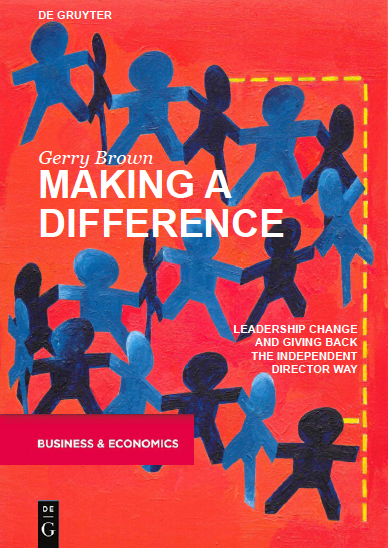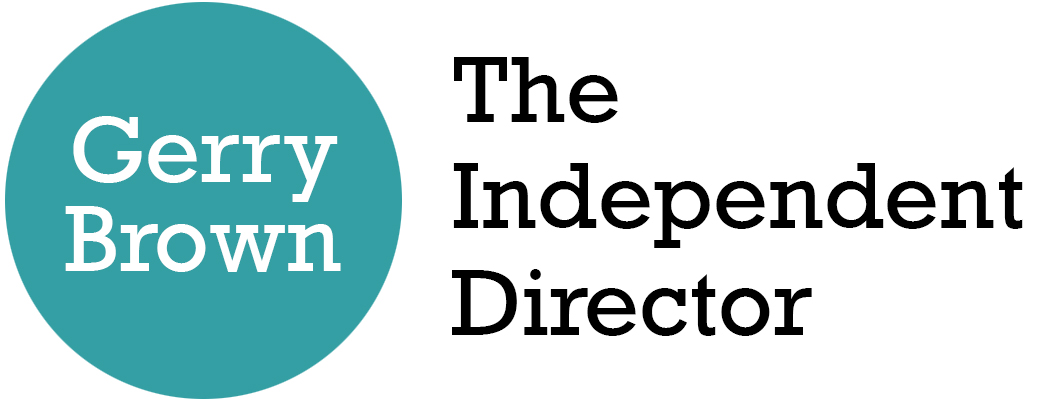
Making a Difference Book Launch: Questions & Answers
The following are the questions arising from the book launch and the replies from Gerry Brown
If you would like a fuller reply please email Gerry
1)What would someone learn from reading this book ?
Amongst the topics covered are;
- The knowledge ,skills and experience needed to succeed as an ID
- The benefits and rewards of being an ID
- The role of an ID
- How to apply for positions
- How selection is made
- Advice for first time IDs
2)How would someone go about becoming an ID in the charity sector ?
There is a chapter in the book about how to apply for positions and another on how selection is made. There are no shortage of volunteering opportunities in the charity sector. So one way of exploring the opportunities of becoming an ID is choose the one which you are interested in and become involved initially as a volunteer and understand the particular charity. Then you will be in a better position to apply for a position as an ID.
3)What is your advice for a first time ID?
Explore the different opportunities in the sectors in which you are interested. Carry out due diligence on specific ID positions. Choose to pursue those that you can enjoy and where you can add value.
4) How can one become an Independent Director?
There is a chapter in the book on how to apply for positions and another on how selection is made.
There are training courses for potential IDs listed in Appendix D
5) You mentioned lots of areas where IDs can add value. What do you think about having an ID with responsibility for oversight on organisational culture?
The responsibility for creating the appropriate culture is for the whole board especially the Chair .However if an ID had specialist expertise in this area then they could certainly be asked to help the board as a whole in this important task.
6) Do you think that the current large fees paid to non - executive directors is compromising their independence?
This is certainly a potential danger. Linking part of the fees to the longer term performance of the company could help.
However most importantly is to select IDs with a track record in demonstrating their willingness to think and behave with an independent perspective on the affairs of the company.
7) Gerry identifies the time and effort needed to be an effective ID.Hopefully most large companies can recognise the benefits they can bring and as such reimburse for the IDs time ,effort and potential risks this can bring .I fear that the risk/reward benefits are much lower for IDs if they are to join smaller or mid sized companies.Certainly this is an area where new IDs can start but is it worth it?
The financial rewards for smaller companies are usually lower ,however if they are linked to the growth performance of the business then they can be equally financially rewarding .For example if the business is owned by Private Equity with an opportunity to receive equity ,then on exit the rewards could be significant.
8) How can parents with young children start to make a difference?
One opportunity would be to be the parent governor on the board of the primary school or nursery where the children attend .
8) Are fewer people likely to volunteer as IDs / trustees as a result of the Kids Company case? And if so what can be done to reassure IDs to serve?
The scandals which unfortunately do take place clearly have an impact not only on the reputation of the specific organisation affected but also on the sector.This could discourage people from donating from being volunteers or becoming a trustee.
In order to prevent this from happening there needs to be more education and publicity about the causes and nature of these scandals and what can be done by boards and IDs to stop scandals.
This book aims to do that.
9) How do Boards get the age diversity needed to address the challenges of the digital world and the preferences of millennials when Boards typically go for experience as a key attribute in hiring?
By carrying out a comprehensive board evaluation to identify the key gaps on the board in terms of diversity including AGE .
10) In Gerry Browns successful career as an ID what would be the most important piece of advice he would give to a new or prospective ID in order to ensure they create an environment to make a real difference?
Get to know the organisation where you are an ID especially it’s challenges and tailor your advice to specific issues where this would make a difference.
11) I am a trustee at my local office and wish to learn how to be more effective in my role?
Reading this book should help ,then arrange to go on a course for IDs see Appendix D of the book .
12) I believe that I have the skills and would like to contribute by becoming an ID of a charity or an educational institution. Where do I start?
Read this book then prepare your own marketing plan including identifying your key contacts who can help with introductions.
13) Based on your experience what questions do you need to ask yourself to check if the organisation is the right fit for yourself ?
Here are some of the questions you should ask yourself
- How can I contribute and add value ?
- Is the chemistry and fit with the Chair and the other directors good ?
- Is it complementary in helping to build a diversified portfolio
- Is it sufficiently challenging ?
- What will I learn ?
14) Have you rejected offers to join Boards as an ID and why ?
Yes I have rejected opportunities because they did not satisfy some of the above criteria.
15) I cannot join the virtual book launch will I be able to see a recording?
Yes you can see a recording on my book website.
